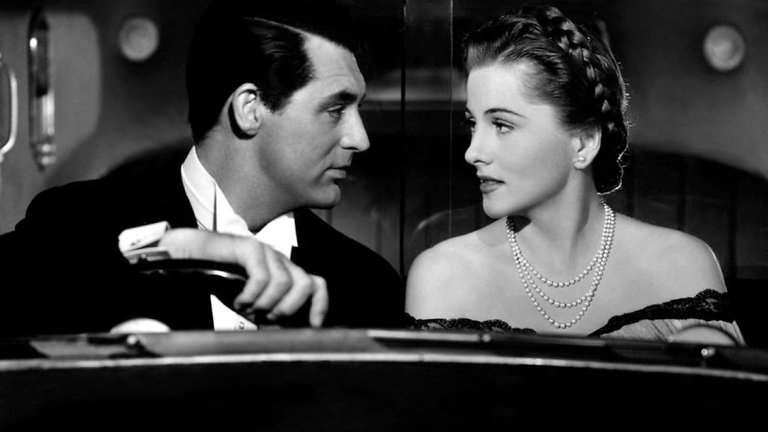Film Review: Suspicion (1941)

Greatness of film makers of Alfred Hitchcock's stature can be seen when their more controversial work are films that wouldn't cause any fuss if made by an ordinary director. In the case of the Master of Suspense, one such work is his 1941 thriller Suspicion.
The film is based on Before the Fact, a 1932 novel by Francis Iles. The plot is set in 1938 England, a year before the Second World War, which was raging during the production of the film. The protagonist, played by Joan Fontaine, is Lina McLaidlaw, the daughter of General McLaidlaw (played by Cedric Hardwicke), a well-off member of the Sussex gentry. While riding a train, she meets Johnnie Aysgarth (played by Cary Grant), a notorious but charming playboy who, at first, seeing her bespectacled, doesn't think much of her but changes his mind after seeing her during a fox hunt. He becomes determined to seduce her and does so easily, because Lina is concerned that she might end up as an old maid. They quickly elope, but after their honeymoon, Lina soon learns that her husband is not only chronically broke but also a hopeless gambling addict who spends money on horse races, with most of that money being obtained through theft, embezzlement, and shamelessly lying to his friends. As time goes by, Lina begins suspecting that Johnnie has married her only for her money and, after her father dies, she begins fearing that he plans to murder her.
Hitchcock had worked with Joan Fontaine a year earlier, in his Oscar-winning Hollywood debut Rebecca. She won an Oscar for Best Actress for the role of Lina McLaidlaw, although many critics claim that such an award was a compensation for not getting it a year before for a much better performance in Rebecca. Fontaine indeed had a better role in the previous film, and many can argue that there are a lot of similarities between both characters, but Fontaine's performance in Suspicion is nevertheless very good and contributes a lot to the success of this film. She is, however, overshadowed by Cary Grant, an actor who was, by that time, specialising in roles in romantic comedies. In Suspicion, he displays great charm and incredible suaveness, but his character becomes much darker until the end of the film when the viewers, just like the protagonist, begin to wonder whether Johnnie is actually a sociopathic murderer. Grant's performance looks even better when we consider that Fontaine and he didn't get along well on the set. Grant didn't get along well with Hitchcock either; a great actor and great director, however, managed not only to patch up their differences after the film but also became lifelong friends. Grant and Fontaine's performances are well-complemented by the supporting cast, most notably the wonderful character actor Nigel Bruce who provides excellent comic relief in the role of Johnnie's old friend Beaky Thwaite. British stage actress Auriol Lee, who tragically died in a traffic accident shortly after production, is also good in the role of a crime author who appears to inadvertently give advice to Johnnie on how to commit the perfect murder.
Hitchcock has again shown his superb skill and direction and easy handling of Hollywood resources that allowed him to almost flawlessly reconstruct his native England in Californian studios. He also easily shifts between various genres within the same film. The beginning, which looks like a screwball comedy, is the best, although not perfect. There is one scene, set during a seemingly innocent walk, that suggests Johnnie violently attacking Lina, which is never properly explained and later gets brushed off. Hitchcock is much more successful in the later stages of the film, where the tone shifts to a dark and often disturbing thriller, with slowly building suspense that culminates in the famous scene in which Johnnie carries a potentially poisoned glass of milk to his scared wife. However, for many adoring Hitchcock's fans, Suspicion gets ruined with the ending, which strays from the original novel and is often considered a cop-out. Hitchcock years later stated that he wanted to remain faithful to the original source and deliver a dark, or at least ambiguous, ending. In the end, he was vetoed by the studio whose executive wanted to follow the Hays Code (which barred the depiction of perfect or unpunished crimes) and were concerned that the audience wouldn't accept Grant as a murderer. Some cinema historians in more recent times have expressed doubt that Hitchcock really wanted a dark ending and claimed that he was at the time, long before being worshipped as a cinema genius, satisfied with the studio's version. Whatever the truth may be, Suspicion has, like some of Hitchcock's earlier works, a relatively weak ending. But that shouldn't prevent modern audiences from enjoying this well-made thriller, which is, despite all the controversies, undoubtedly Hitchcockian.
RATING: 6/10 (++)
Blog in Croatian https://draxblog.com
Blog in English https://draxreview.wordpress.com/
Leofinance blog https://leofinance.io/@drax.leo
Unstoppable Domains: https://unstoppabledomains.com/?ref=3fc23fc42c1b417
Hiveonboard: https://hiveonboard.com?ref=drax y
Bitcoin Lightning HIVE donations: https://v4v.app/v1/lnurlp/qrcode/drax
Rising Star game: https://www.risingstargame.com?referrer=drax
1Inch: https://1inch.exchange/#/r/0x83823d8CCB74F828148258BB4457642124b1328e
BTC donations: 1EWxiMiP6iiG9rger3NuUSd6HByaxQWafG
ETH donations: 0xB305F144323b99e6f8b1d66f5D7DE78B498C32A7
Posted using CineTV